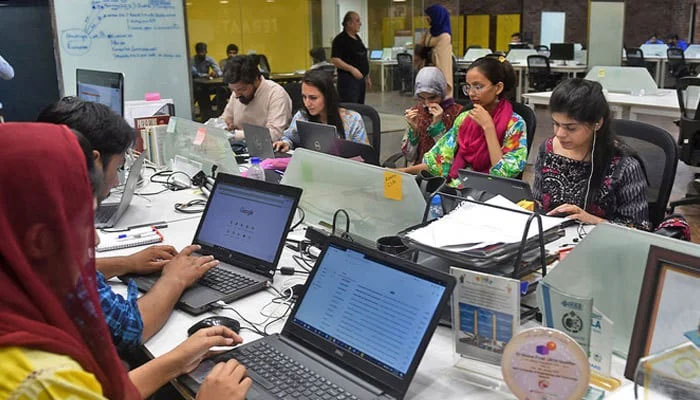Breaking the backbone: Tax on the salaried
Incidence of taxes on salaried segment has in fact increased in range of 25-40 per cent
THE salaried segment, which works in the formal sector and gets its taxes withheld from its income automatically, now has to pay more taxes on its income. This is despite budget promises of no additional taxes on the salaried.
The incidence of taxes on the salaried segment has in fact increased in the range of 25-40 per cent, mostly in the middle to upper-middle income brackets.
It is to be noted that this segment has lost significant purchasing power over the last five years. With inflation exceeding more than 100 per cent over the last five years, wages have not kept pace, as any increment often lags behind the overall inflation levels.
Moreover, a progressively worse taxation regime over the years has led to a scenario where this particular segment has been treated the most harshly by policymakers. It is estimated that post-tax real incomes over the last five years have reduced by more than 40 per cent for most individuals in various tax brackets. This effectively implies a loss in purchasing power and a gradual erosion in the quality of life of such households. As utility prices have also increased at a pace much higher than inflation, households have had to cut back on many such expenses.
Due to this, there is little to no incentive for individuals to operate in the formal segment. This has led to an acceleration in the exodus of intellectual capital from the country -- resulting in a big gap between the skills that are required for the future, and the supply for these. The marginal price, or the wage at which individuals may actually move abroad from the country, has never been lower – as the purchasing power of the rupee is eroded. And the government, instead of incentivizing such individuals to stay, further burdens them with more taxes.
Instead of expanding the tax net, the government further deepened it, which only reduced after-tax income for individuals across various tax brackets. Moreover, in many such cases, expenses such as education and health have grown at a faster rate than inflation – making inflation for the formal salaried segment potentially much higher than the general inflation.
Excessive taxation measures and erosion of the value of the rupee have led to a rapid destruction of the middle class, which ought to be a bulwark for an economy. This is visible in the largely flat consumption of electricity on a per capita basis over the last five years. As incomes stagnated in real terms and expenses increased, households continued to cut back on the same.
By penalizing the existing taxpayers, the government has done a disservice to them. This could lead to unintended consequences, which may include an exodus of intellectual capital, a transition from formal salaries to off-shore transfers wherever possible, and a general lack of trust in the government to roll out any equitable taxation plan.
It has been identified time and again that the tax net needs to be widened, but due to either lack of imagination or just political will, this is simply not possible – resulting in a deepening of the tax net, and destruction of real incomes across participants in the formal economy. There is a strong disincentive to operate in the formal economy -- and the government refuses to change this.
(Macroeconomist and assistant professor at IBA)
-
 Snow Forecast Warns Of Reduced Visibility And Travel Risks In Ontario
Snow Forecast Warns Of Reduced Visibility And Travel Risks In Ontario -
 Margot Robbie Reveals 'worst' Gift She Received From Co-star
Margot Robbie Reveals 'worst' Gift She Received From Co-star -
 Casey Wasserman Says He ‘deeply Regrets’ Ghislaine Maxwell Emails After DOJ File Release
Casey Wasserman Says He ‘deeply Regrets’ Ghislaine Maxwell Emails After DOJ File Release -
 Discord Face Scan Age Verification Rules Explained As Platform Tightens Access
Discord Face Scan Age Verification Rules Explained As Platform Tightens Access -
 Cavaliers Vs Nuggets Showdown Heats Up After Blockbuster Trade
Cavaliers Vs Nuggets Showdown Heats Up After Blockbuster Trade -
 Where Kelsea Ballerini, Chase Stokes Stand After Second Breakup
Where Kelsea Ballerini, Chase Stokes Stand After Second Breakup -
 Thunder Vs Lakers: LeBron James Playing As Lakers Miss Luka Dončić
Thunder Vs Lakers: LeBron James Playing As Lakers Miss Luka Dončić -
 Pistons Vs Hornets Recap: Brawl Erupts With 4 Players Getting Tossed Before Detroit Victory
Pistons Vs Hornets Recap: Brawl Erupts With 4 Players Getting Tossed Before Detroit Victory -
 Gordie Howe Bridge Faces Uncertainty After Trump Warning To Canada
Gordie Howe Bridge Faces Uncertainty After Trump Warning To Canada -
 Air Canada’s Flights To Cuba Halted As As Aviation Fuel Crisis Worsens
Air Canada’s Flights To Cuba Halted As As Aviation Fuel Crisis Worsens -
 Marc Anthony Weighs In On Beckham Family Rift
Marc Anthony Weighs In On Beckham Family Rift -
 New Guest Host Announced For The Kelly Clarkson Show
New Guest Host Announced For The Kelly Clarkson Show -
 Why Prince William’s Statement Over Jeffrey Epstein ‘says A Lot’
Why Prince William’s Statement Over Jeffrey Epstein ‘says A Lot’ -
 Paul McCrane Reveals Why Playing Jerks Became His Calling Card
Paul McCrane Reveals Why Playing Jerks Became His Calling Card -
 Prince William, Kate Middleton Thrashed For Their ‘bland’ Epstein Statement
Prince William, Kate Middleton Thrashed For Their ‘bland’ Epstein Statement -
 Bad Bunny Stunned Jennifer Grey So Much She Named Dog After Him
Bad Bunny Stunned Jennifer Grey So Much She Named Dog After Him




